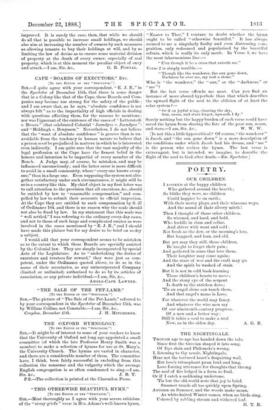"THIS OTHERWISE BEAUTIFUL HYMN."
[To THE EDITOR OF THE "SPECTATOR."]
SIB,—Most thoroughly as I agree with your severe criticism of the "stony griefs" verse in Mrs. Adams's well-known hymn, "Nearer to Thee," I venture to doubt whether the hymn ought to be called "otherwise beautiful." It has always seemed to me a singularly faulty and even distressing com- position, only redeemed and popularised by the beautiful refrain, which is really its only merit. In Verse 1, we have the most inharmonious line :— " E'en though it be a cross that raiseth me."
Verse 2 is simply terrible :— " Though like the wanderer, the sun gone down, Darkness be over me, my rest a stone."
Who is "the wanderer," the "sun," or the "darkness," or " me " ?
But the last verse offends me most. Can you find an instance of more absurd hyperbole than that which describes the upward flight of the soul to the oblivion of at least the solar system ?— " Or if on joyful wing, cleaving the sky, Sun, moon, and stars forgot, upwards I fly."
Surely nothing but the happy burden of each verse could have saved the hymn from sharing the fate of the poor sun, moon, [Is not this a little hypercritical? Of course," the wanderer" is Jacob, and "the sun gone down" is a mere description of the conditions under which Jacob had his dream, and " me " is the person who recites the hymn. The last verse is extravagant, but is intended, we imagine, to describe the flight of the soul to God after death.—ED. Spectator.]










































 Previous page
Previous page